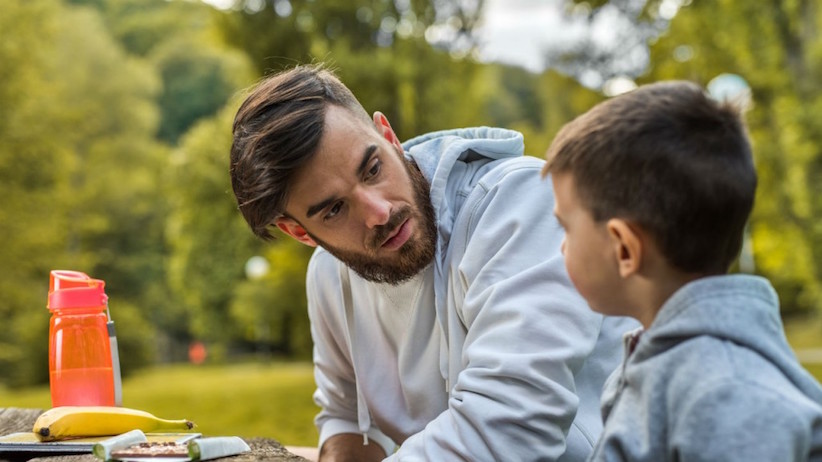Why you should talk to your kids about sex earlier than you think
The problem isn’t convincing parents they should talk to their kids about sex. It’s convincing them that they need to start much earlier, writes sex educator Cory Silverberg.

(iStock)
Share

Most parents squirm at the idea of talking to their kids about sex for a simple reason: We aren’t that comfortable talking about sex, period.
There seems to be a general consensus that kids do need to be taught about sex. A recent survey published in the Canadian Journal of Human Sexuality found that 87 per cent of parents believe sex education is important enough that it should be taught in schools. In the survey, parents rated themselves, doctors and nurses, and the school system as the most competent sources of sex ed.
[widgets_on_pages id=98]
This is great news.
But less great is the age at which parents think that education should happen. In that survey, parents agreed it should start by middle school, when kids are 11 to 14 years old. Similarly, in a recent survey commissioned by Rogers Media, when parents were asked “At what age should you start talking to your kids about sex?” the average answer was 11. Almost a quarter said 12, and 9 per cent said 13.
So the problem as I see it—and as a sex educator and author, I think about this stuff a lot—isn’t convincing parents they should talk to their kids about sex. It’s convincing them that they need to start much earlier.
Let me give it a try.
READ MORE: A new survey explores what makes us Canadian
For one thing, if you start talking to your kids about sexuality when they’re still small, it’ll be way easier when you eventually have to talk to them about actually having sex. This is partly because you’re getting practice, but also because every time you make it through a conversation, you’ve created a space for you and your kid to come back to.
What does talking about sexuality to four- or five-year-olds look like? It’s openly answering (not dodging) their questions like, “Why do grown-ups like to kiss?” or “How come that boy is wearing a dress?” Sex education with very young children is also about teaching them the proper names of all their body parts—especially the girl ones that we never seem to name (all girls should know the difference between their vulva and their vagina, for instance).
If you start with these types of topics, then talking to your six-year-old about why grandma’s house isn’t the place to put his hands down his pants will be less awkward—I promise. And this will make it way easier to talk to him about crushes when he’s nine, or about consent as a teen.
If you wait until your kid is 11 to talk about sex, the amount of information you’ll have to impart will be overwhelming. Trying to explain sex to an 11-year-old when you’ve never talked about anything sex-related before is kind of like trying to teach your child algebra before they know what numbers or letters are: It’ll be way too much all at once. You won’t know where to start (and your own hyperventilating won’t be conducive to the tone and creativity the moment calls for).
No matter how painful it is for you to talk to your kids about sex, doing so, and making sure they get access to comprehensive sex education, keeps them safer. A 2012 meta-analysis of multiple studies found that sex education does not lead kids to having sex earlier, plus it often results in them waiting longer before starting to have sex, and increases the likelihood that they’ll use contraception when they do have sex. Can’t argue with those benefits.
READ MORE: A two-four of facts for Canada 150
If you’re nervous about talking to your kids about sex, think about what will happen to your kids if you don’t. Would you let your 16-year-old get behind the wheel of a car without learning about the rules of the road, the importance of seat belts and something about how much a broken tail light costs? Probably not. Imagine the possible negative outcomes. Now consider how much more complicated sex is than driving.
Of course, the analogy only goes so far; teaching your kid to drive safely isn’t the same as teaching your kid to develop a safe and healthy sexuality. Among other things, the latter is something none of us get a lot of practice doing.
Which brings me to my final, and I think best, arguments for why you want to start early with your kids. If you hang in there, the awkwardness and embarrassment that you may experience at first will eventually shift into something else: awkwardness and laughter. And learning to talk with our kids about our weird bodies and the even weirder things we sometimes choose to do with them actually makes us better at talking about sex with everyone, including our own intimate partners.
It’s hard for a lot of us to admit this, but the No. 1 reason we find it so hard to talk about sex with our kids is that we find it hard to talk about sex with anyone. Getting better at it, not surprisingly, leads to better sex in our own lives. Talk about a win-win!
Cory Silverberg’s most recent book, Sex Is a Funny Word (with Fiona Smyth) won the Norma Fleck Award for Canadian Children’s Non-Fiction from the Canadian Children’s Book Centre.
